We all know that cats can be curious creatures, often pawing their way into situations that amuse and puzzle us. But what happens when their curiosity leads them down the path of alcohol? Can cats drink alcohol? The focus should always be on keeping your pet safe, healthy, and happy with appropriate food and drink choices that promote their well-being.
In this article, we’ll delve into why alcohol and cats don’t mix, the potential problems they can pose, and offer tips on keeping your curious companion safe and sound.
Can Cats Drink Alcohol?
The short and definitive answer is a resounding no! Like with chocolate or certain plants, alcohol is a big no-no for our feline friends.
“Please take it seriously! No alcohol is allowed for your pets.” – Veterinarian Mykhailo Ozmenchuk.
Cats should never be given alcohol under any circumstances. Alcohol, even in the smallest amounts, is highly toxic to cats and can lead to a range of severe health issues, including but not limited to poisoning, liver damage, and, in some cases, death.
The metabolism of cats is not designed to process alcohol, and because of their small size, even a tiny amount can be fatal.
The Lure of Libations
Picture this: you’re enjoying a quiet evening at home with a glass of fine wine or a chilled beer, and your furry friend decides to join the fun. It might seem like a comical scene from a cartoon, but the reality is far from amusing.
Cats are naturally curious, and anything new or exciting can catch their attention – including the aroma of alcohol. But before you let your cat take a sip from your glass, let’s explore why this seemingly harmless act can lead to serious consequences.
Risky Combination of Alcohol and Cats
Alcohol affects humans in a certain way due to our physiology, but when it comes to cats, their bodies react quite differently. Unlike us, cats lack the necessary enzymes to metabolize alcohol efficiently. Even a small amount of alcohol can profoundly impact their delicate systems.
Whether it’s wine, beer, spirits, or any other alcoholic beverage, the effects can be swift and severe. Ethanol, the active ingredient in alcoholic drinks, is a central nervous system depressant. In cats, its effects can range from disorientation and unsteady movements to vomiting, seizures, and even coma.
Considering the potential health risks and the cost of emergency veterinary care, it’s wise to have a financial safety net in place. Check out best pet insurance companies & plans to ensure you’re prepared for any pet health emergencies.
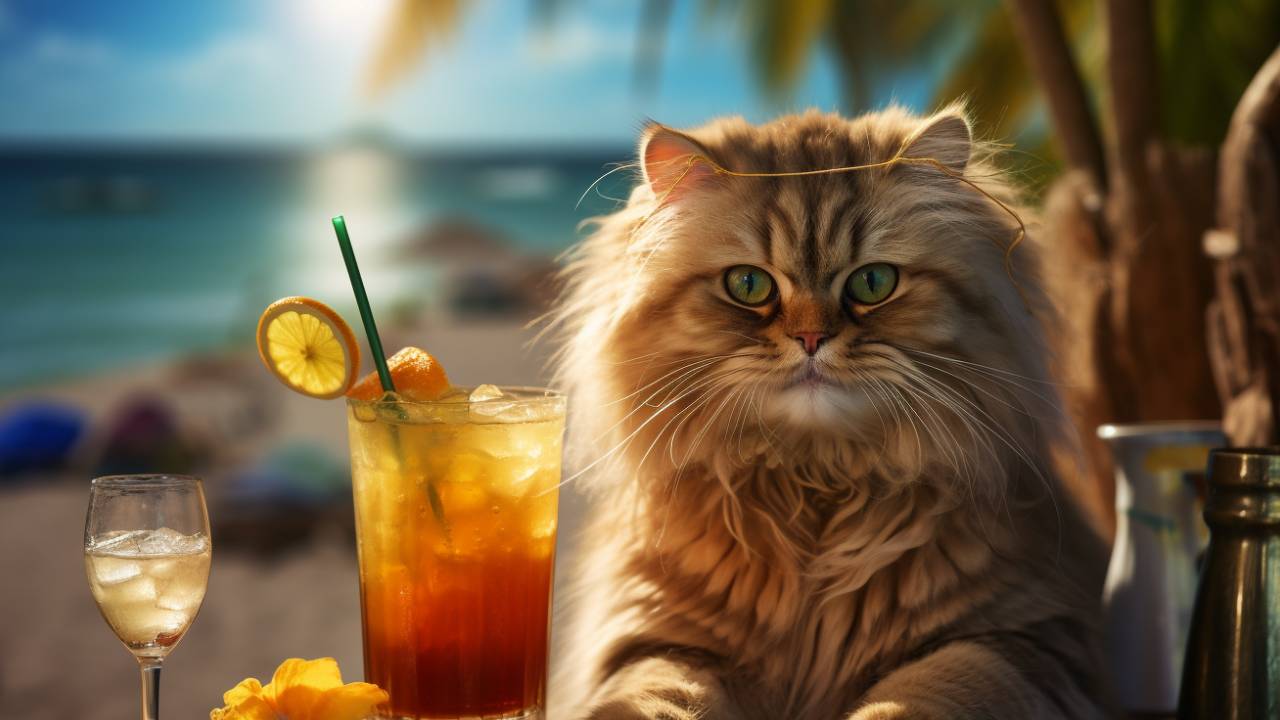
Potential Problems and Perils
The problems arising from feline alcohol consumption are more than a passing concern. Cats can suffer from alcohol poisoning, which requires immediate veterinary attention.
Symptoms can include lethargy, shallow breathing, tremors, and organ failure. It’s a scary thought that should be a stark reminder to keep alcohol out of your cat’s reach.
Furthermore, alcohol can also irritate a cat’s gastrointestinal tract, leading to vomiting and diarrhea. Dehydration becomes a concern, and a cat’s kidneys can be put under significant stress.
Long-term effects can include damage to internal organs and a compromised immune system, leaving your beloved feline friend vulnerable to other health issues.
Tips for Keeping Your Cat Safe
Prevention is key to keeping your cat safe from the perils of alcohol. Here are some tips to ensure your furry friend doesn’t get a taste for the forbidden brew:
- Secure Storage: Store your alcohol in an inaccessible place to your cat. High shelves or locked cabinets are good options to prevent accidental nosing.
- Clean Spills Promptly: Accidents can happen, especially if your cat’s curiosity leads to knocking over a glass. Clean up any spills immediately to eliminate the risk of ingestion.
- Educate and Inform: Make sure everyone in your household knows the dangers of alcohol for cats. A collective effort ensures your cat’s safety.
- Offer Suitable Alternatives: Choose cat-friendly snacks or treats to share a special treat with your feline companion. You might wonder about other common household drinks. Discover if tea is safe for cats.
- Observe and Monitor: Monitor your cat’s behavior. If you suspect your cat has ingested alcohol or displays unusual symptoms, seek veterinary care immediately.
For further information on substances that pose risks to pets, including alcohol, the FDA has conducted research highlighting various edible dangers, which provides essential insights into keeping your pet safe from common household dangers.
The risks and potential problems far outweigh any perceived humor. As responsible pet owners, we must protect our furry companions from harm, even if their curiosity gets the best of them.

FAQs
Can a small sip of alcohol hurt my cat?
Even a small sip of alcohol can harm your cat. Cats lack the enzymes to process alcohol, so any amount can be risky. It’s best to avoid exposing your cat to alcohol altogether.
My cat accidentally licked spilled beer. Is this a problem?
A single lick of spilled beer isn’t an immediate concern, but alcohol can irritate their system. Watch for unusual symptoms and consult your vet if needed.
Can I offer non-alcoholic beer to my cat?
Non-alcoholic beer might lack ethanol, but other ingredients can still harm cats. Opt for cat-friendly treats instead.
What do I do if I think my cat drinks alcohol?
Contact your vet if you suspect alcohol ingestion. Symptoms can range from disorientation to severe issues like vomiting or seizures. Quick action is important.
Can even a small amount of alcohol affect my cat’s health long-term?
Yes, even a small amount can have lasting effects, damaging organs and weakening their immune system.
Are some types of alcohol safer for cats than others?
No, all alcohol is unsafe for cats due to ethanol. Cats can’t handle any alcohol.
How can I stop my cat from being curious about alcohol’s smell?
Use citrus scents or safe plants to deter them. Keep alcohol hidden and offer engaging toys to keep them busy and happy.
So, the next time you’re enjoying a glass of wine or raising a toast with friends, remember to keep the libations well out of reach of your feline friend.


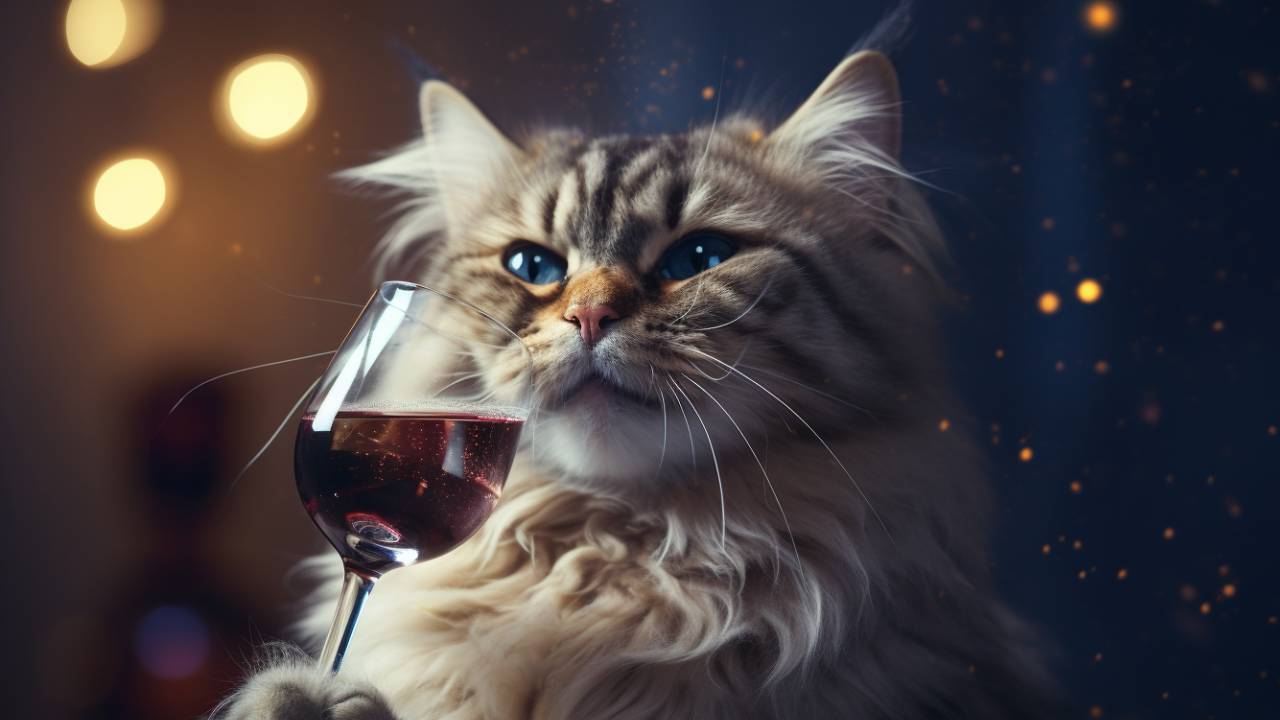
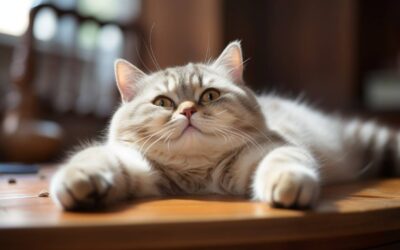
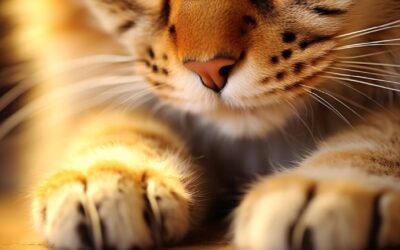
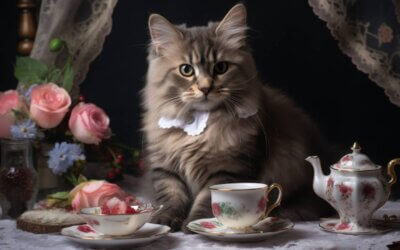
no way 🙀